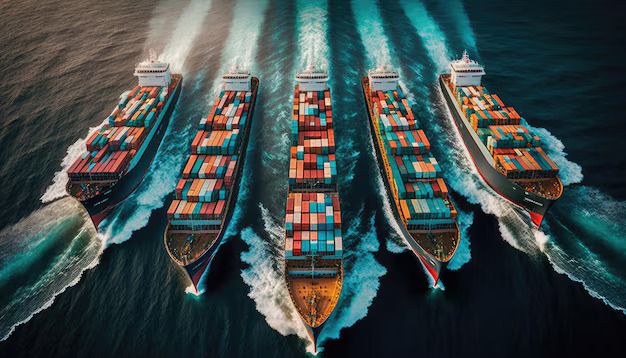
New alliance formation intensifies battle between major lines
SINGAPORE : With the container shipping alliance landscape expected to change in less than five months, it is worth examining the current dynamics of the alliances and how they are expected to evolve when the new alliances are formed.
Currently, the 2M Alliance, composed of Maersk and MSC, continues to hold the leading position with the largest fleet capacity. Ocean Alliance (including CMA CGM, COSCO, Evergreen and OOCL) follows closely, while THE Alliance (Hapag Lloyd, HMM, Yang Ming and ONE) remains in third place with significant distance.
Despite the overall increase in fleet size across all alliances, the share percentages reveal a more nuanced picture. Throughout the last five years, the 2M Alliance maintained a relatively stable share, dominating the market. Maersk and MSC are the world’s largest ocean carriers, so their alliance has expectedly outperformed their competitors.
However, Ocean Alliance has achieved to sustain a close distance to 2M, despite experiencing a slight decline in its share between 2022 and 2023.
THE Alliance, on the other hand, faced a small dip in its share from 2021 to 2022 but has since remained stable.
The Shift in Container Shipping Alliances
The container shipping landscape is set to undergo a significant transformation in February 2025, as new alliances emerge, reshaping the competitive dynamics of global shipping. According to Container News, based on fleet size and share data from 2024, the formation of new alliances is expected to create a more competitive environment in the industry.
Ocean Alliance, which is the only alliance that will remain the same, will climb to the top spot in terms of fleet size and market share, positioning itself as the leading force in global trade. However, the newly formed Gemini Cooperation of Maersk and Hapag Lloyd is anticipated to be a close contender. The two new partners have already announced service network options, which will be effective from Feburary 2025.
It is imporant to note that MSC, which has entered into some slot exchange agreements but will mainly operate independently with 6,082,623 TEUs, is in a close distance from Gemini. With the Swiss/Italian ocean carrier on a newbuilding spree, it could potentially surpass the overall fleet of Maersk and Hapag-Lloyd on its own.
Meanwhile, Premier Alliance, formed by HMM, Yang Ming, and ONE, is expected to rank fourth in terms of fleet size, but the overall competitiveness will remain strong, with fleet expansion and additional partnerships across the board.
When it comes to market share percentage, Ocean Alliance is expected to take the lead, followed by Gemini Cooperation in second place. MSC will claim the third position on its own, while Premier Alliance rounds out the fourth spot.
This shift in alliances is poised to make the competitive landscape fiercer, particularly between Ocean Alliance, Gemini, and MSC, as the gap between the top players narrows.
The upcoming formation of new container alliances in 2025 marks a pivotal moment for global trade, bringing significant changes in fleet distribution and market share dynamics. Between 2019 and 2024, all the alliances showed a steady fleet growth. Despite some fluctuations, including small declines for THE and Ocean alliances, the competitive landscape remained relatively stable during this period.
However, the formation of new alliances in 2025 is set to intensify competition. Ocean Alliance will take the lead, but the newly formed Gemini Alliance will emerge as a strong challenger. MSC can stand independently, with the freedom of movement this provides being a significant advantage. Premier Alliance appears to be starting from behind in this race, but additional synergies such as its partnership with MSC, could provide an extra boost.
Overall, the competitive maritime environment in 2025 will be defined by a narrower gap between leading players, making the fight for dominance more intense than in previous years.

